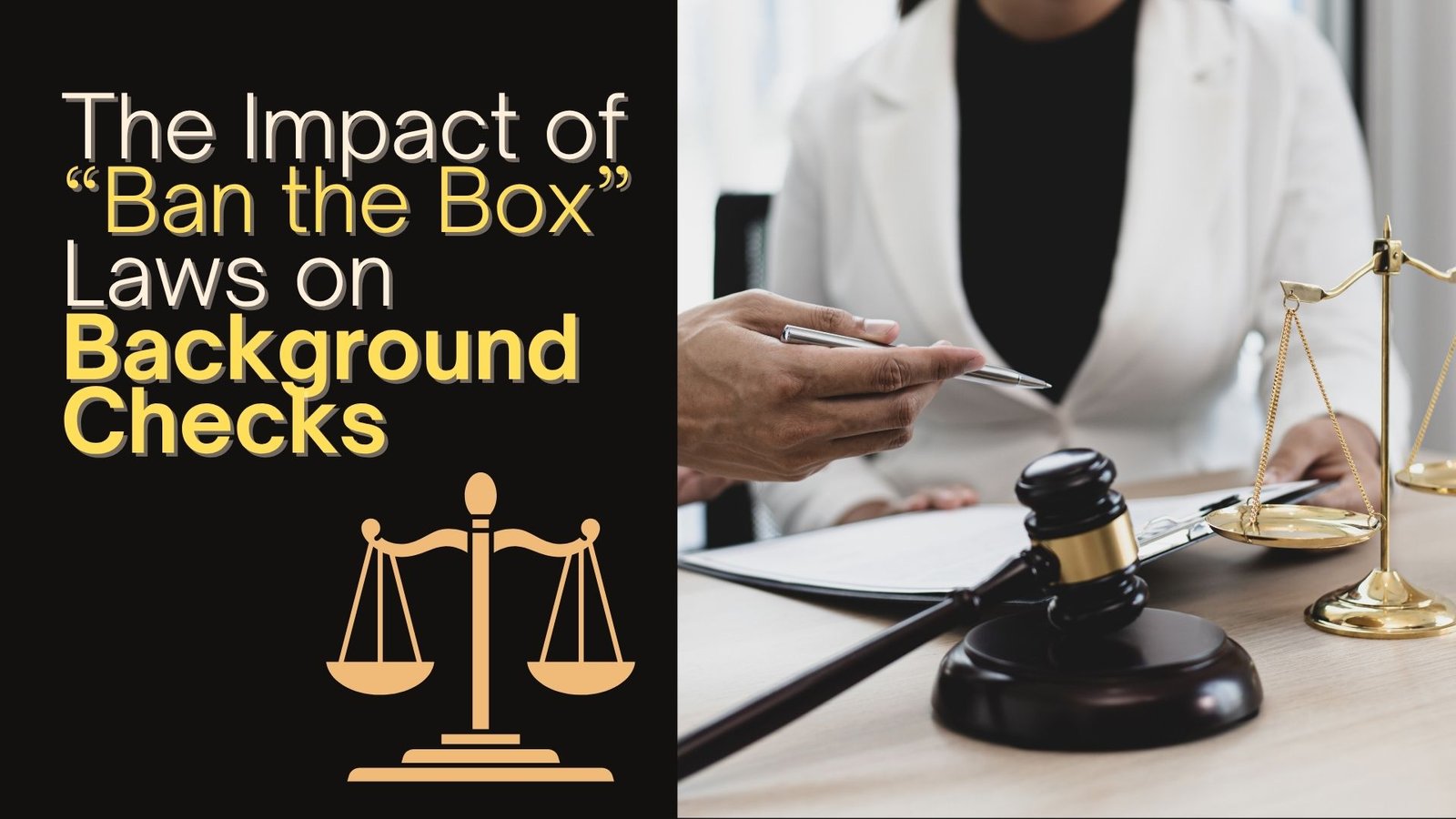The Impact of “Ban the Box” Laws on Background Checks

The “Ban the Box” laws have gained attention in recent years. They impact the way background checks are conducted during the hiring process. The impact of “Ban the Box” laws on background checks reshapes how employers assess job candidates. These laws now prohibit employers from asking applicants about their criminal history at the outset. Instead, they evaluate candidates based on their qualifications.
Background checks are impacted significantly by “Ban the Box” laws. Employers can’t dismiss candidates based on their criminal history anymore. It’s meant to reduce discrimination and give people with criminal records more opportunity. At the same time, it’s going to make it harder for employers to do background checks later on. We’ll look at the pros and cons of these laws for both employers and job seekers in this blog.
“Ban the Box” Laws: What Are They?
An employer can’t ask job applicants about their criminal history early in the application process under “Ban the Box” laws. They’re meant to stop people with criminal records from being automatically disqualified. In general, employers can’t ask about criminal history until later in the hiring process. Laws vary by jurisdiction.
The laws aim to get rid of a checkbox question on job applications asking about criminal records. This allows employers to consider people based on their skills and experience without judging them too soon.
“Ban the Box” Laws and Background Checks
Employers are affected in a few ways by “Ban the Box” laws on background checks. It changes how they screen potential candidates. Traditionally, employers would check an applicant’s criminal background early in the process. As a result of these laws, background checks get done later in the hiring process, which has positive and negative consequences.
Employers’ pros
Diversity is one of the benefits of “Ban the Box” Laws on Background Checks. Employers have access to a broader pool of candidates, including those with criminal records, who might have been overlooked in the past. It’ll make it easier for people to get back into the workforce once they’ve paid their dues.
Getting rid of the criminal history question early on reduces discrimination risk for employers. Companies avoid bias against people who have made mistakes in the past but are otherwise qualified because this promotes fair hiring practices.
Expanded Talent Pool: Employers may consider applicants they wouldn’t have otherwise. This can lead to finding untapped talent with valuable skills.
Employers’ cons
The impact of “Ban the Box” laws on background checks can slow hiring down. If employers can’t check criminal backgrounds upfront, they have to wait until later. For jobs that require high security, this adds time and complexity to the hiring process.
Increased Hiring Costs Companies may need to conduct more thorough background checks, like criminal records checks and reference checks. This can get expensive and time-consuming.
Potential Safety Risks Hiring people with worrying criminal records can pose a safety or reputational risk, especially for jobs requiring high levels of trust and security.
“Ban the Box” Laws and Background Checks
Background checks are also impacted by “Ban the Box” laws, particularly for people with a criminal record, which give them a chance to present their skills and qualifications.
Job seekers’ pros
Fairer Hiring Process By removing the criminal history question early in the hiring process, these laws give job seekers a better chance of being evaluated on their merits.
Increased Job Opportunities People with criminal records can now compete on an equal basis with other job candidates thanks to these laws.
Opportunity for Redemption Candidates have the chance to explain their criminal history later in the process. They can share how they’ve changed and why they’re qualified.
Job seekers’ cons
Ban the Box’ laws on background checks impact job seekers with criminal records, so employers often choose not to hire them.A criminal record might lead to rejection at that stage, but employers can still check criminal backgrounds later in the process.
It’s possible employers can still view applicants with criminal records negatively even though they don’t ask about their criminal history early on. The stigma around a criminal record still affects job seekers’ chances, even when employers evaluate them fairly.
Background Checks and “Ban the Box” Laws: Employer Legal Considerations
Businesses must also consider the legal implications of “Ban the Box” Laws on Background Checks. Laws vary from jurisdiction to jurisdiction, so businesses need to comply with local laws.
The application of “Ban the Box” laws differs by province and territory in Canada. Employers need to keep up with the local laws to avoid legal trouble.
Moreover, businesses have to still conduct background checks on potential employees. Even if employers don’t discuss criminal histories early on, they can still review them later. In any case, employers should consider how a criminal record fits the job.
Background checks with Crimcheck Canada
It’s okay to hire Crimcheck Canada if you’re an employer in Canada and need help conducting a thorough background check. You can stay compliant with “Ban the Box” laws while keeping your hiring process reliable with Crimcheck Canada’s Online Criminal Background Check, CRC check, and Crjmc service.
In addition, Crimcheck Canada is committed to helping businesses navigate these new rules and hire wisely. For more information on managing background checks effectively in light of the changing legal landscape, employers can contact Crimcheck Canada.
Background checks and “Ban the Box” laws
‘Ban the Box’ laws have a huge impact on background checks. They make hiring more fair, more diverse, and less discriminatory. However, they also come with challenges, like longer hiring times and safety concerns. It’s important for both employers and job seekers to adjust to the changes brought on by these laws.
For employers, it’s important to adapt their hiring practices and make sure compliance with local laws. For job seekers, these laws give them a fair shot at getting jobs based on their skills and qualifications. We help businesses make sure their hiring processes are effective and compliant by navigating the impact of these laws.
Follow Crimcheck Canada on Facebook for the latest updates on background checks.




